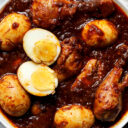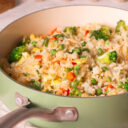Dal Tadka with Egg

Ingredients
Dal
- 1 cup (250 mL) dry red lentils
- 1-2 tbsp oil or ghee
- 1 tsp (5 mL) cumin seeds
- 1 red onion, finely diced
- 2 tsp (10 mL) minced garlic
- 2 tsp (10 mL) minced ginger
- 1 tomato, diced
- 2 tbsp (30 mL) Thai red curry paste
- 2 tsp (10 mL) garam masala
- 1 tsp (5 mL) kashmiri chili powder
- ½ tsp (2.5 mL) turmeric
- 1 can coconut milk
- 1 tsp (5 mL) brown sugar (optional)
- Salt, as needed
- 4 eggs
- Finely chopped cilantro and parsley, for garnishing
Tadka
- 3 tbsp (45 mL) ghee or oil, or a combination of both
- 2-4 dried red chillies
- 1 tbsp (15 mL) minced garlic
- 1 tsp (5 mL) cumin seeds
- ½ tsp (2.5 mL) kashmiri chilli powder
Roti
- 3 cups (750 mL) all-purpose flour
- 2 tsp (10 mL) baking powder
- 1 ½ tsp (7.5 mL) salt
- 1 tsp (5 mL) sugar
- 1 tbsp (15 mL) oil
- 1 ¼ cups (315 mL) warm water, or slightly more
- ⅓ cup (75 mL) ghee or butter, for laminating dough
- ⅓ cup (75 mL) ghee or oil, plus more as needed, for greasing, frying and basting roti
Instructions
Dal
- Step 1
Rinse the lentils in a fine mesh sieve.
- Step 2
Place the lentils in a pot large enough to add other ingredients into it. Cover with water and boil until tender, about 20 minutes. When the lentils are tender, add more water if necessary to make a thick soup consistency. Set aside.
- Step 3
In a separate pan, add 1 tablespoon (15 mL) oil or ghee and cumin seeds. Sauté for a minute until fragrant. Add the onion; sauté until soft and translucent. Add the garlic and sauté for 1 to 2 minutes, making sure it does not burn.
- Step 4
Add the tomato and sauté for 4 to 5 minutes until cooked down.
- Step 5
Add the curry paste and stir for about 2 minutes. Add the garam masala, kashmiri chili powder, and turmeric and mix well.
- Step 6
Add the coconut milk and cook over medium heat, stirring constantly until coconut milk is reduced by at least half and thickened slightly. The cooking time will depend on the thickness of the coconut milk which varies by brand.
- Step 7
Add the brown sugar, if using.
- Step 8
Remove the thickened coconut spice mixture from the heat and add it to the cooked lentils. Stir the curry mixture until well combined.
- Step 9
Thin the mixture with water if needed. You want a soup consistency but this is personal preference. Simmer for 10 minutes, stirring constantly and watching the water level of the curry, adding more as necessary. Mix in additional ghee for added richness if you want. Taste and adjust for salt, if necessary.
- Step 10
Crack 3 to 4 eggs into the lentils; cover and let simmer for about 5 minutes until the eggs firm up as much as you like. Alternatively, you may poach the eggs and add them on top of the lentils when you serve them.
- Step 11
Season with additional garam masala, if desired.
- Step 12
Spoon tadka over top for extra flavour, if desired.
Tadka
- Step 1
In a small pan over medium heat, add the ghee and cumin seeds and fry until aromatic.
- Step 2
Stir in the red chillies, garlic, and kashmiri chilli powder. Don’t let the garlic brown.
- Step 3
Remove from the heat. Pour over the dal.
- Step 4
Serve with rice or roti.
Roti
- Step 1
In a large bowl, stir together the flour, baking powder, salt and sugar.
- Step 2
Make a well in the flour mixture; add 1 tablespoon (15 mL) oil and the warm water. Stir together until mixture can be gathered into a ball. Knead for about 30 seconds to 1 minute to form a soft and sticky dough. If the dough is too sticky, add flour a tablespoon (15 mL) at a time until the dough is workable. If it’s too dry, add water a tablespoon (15 mL) at a time until the dough comes together.
- Step 3
If you are having a hard time with the dough, let it rest for 15 minutes before dividing it into parts. (This does not mean you can skip resting in the next step.)
- Step 4
Cut the dough into 6 equal pieces and form roughly into balls. Set aside and let the dough rest for 15 to 30 minutes. Resting the dough helps with gluten development and creating tender roti.
- Step 5
Place each ball of dough on a heavily floured surface and roll out into a circle, 12 inches (30.5 cm) in diameter. They do not have to be perfect circles; you will be rolling them out again later.
- Step 6
Laminate the dough by using your fingers, the back of a spoon, or a knife to rub ghee or softened butter (about a tablespoon/15 mL per ball) over the surface of the dough. (If necessary, use the microwave to slightly soften the butter or ghee.) Lightly sprinkle with flour.
- Step 7
Use a knife to slice the dough starting at the centre. (You are not cutting the dough all the way across.) Roll the dough clockwise to form a cone.
- Step 8
Push the pointy cone tip inwards. Cover the dough with a clean cloth while repeating this laminating process with the remaining 5 pieces of dough.
- Step 9
Oil each piece to prevent the dough from drying out. Let rest for 2 to 8 hours in the fridge.
- Step 10
Remove the dough from the fridge about 30 minutes before you are ready to cook.
- Step 11
Gently flatten out each cone. Roll out the dough from the centre working outwards. Rotate the dough each time you roll to make a circle. The roti should be flattened and rolled slightly larger than the diameter of the pan used to fry the roti as it will shrink slightly when lifted and placed into the pan. Therefore, roll the roti to 11 inches (28 centimeters) if using a 10-inch (25.5 centimeter) pan. Roll the roti to 10 inches (25.5 centimeters) for a 9-inch (23 centimeter) pan etc.
- Step 12
Heat a griddle, frying pan, or cast iron or crepe pan to medium heat. Gently place the dough in the pan. Using ghee or oil, heavily oil the other side of the dough making sure you oil the edges too.
- Step 13
Cook until tiny bubbles or air pockets appear on the top of the roti, then flip the dough being careful so it does not burn.
- Step 14
The roti may be crispy as soon as it comes off the hot pan. If you prefer it to be very flimsy, place it in a bowl and cover it with a clean dish cloth. After about 5 minutes the steam will soften it.
- Step 15
Serve warm with Dal Tadka or your favourite side dish.
 Tips
Tips
Created for eggs.ca by Nadia Boachie. Nadia is the creative mind behind Travelandmunchies, a media platform where she explores the world through global recipes she makes in her kitchen. You can find her on Instagram, TikTok or her site, Travelandmunchies.
This recipe was developed using Blue Dragon red curry paste. If using another brand (e.g. Thai Kitchen) that is thicker and more concentrated, use 1 to 1 ½ tablespoons (15 to 22 mL).
Nutrition Facts
| Per serving | |
|---|---|
| Calories | 1541 |
| Fat | 97 g |
| Saturated Fat | 59 g |
| Trans Fat | 0 g |
| Carbohydrate | 131 g |
| Fibre | 21 g |
| Sugars | 9 g |
| Protein | 36 g |
| Sodium | 1762 mg |



